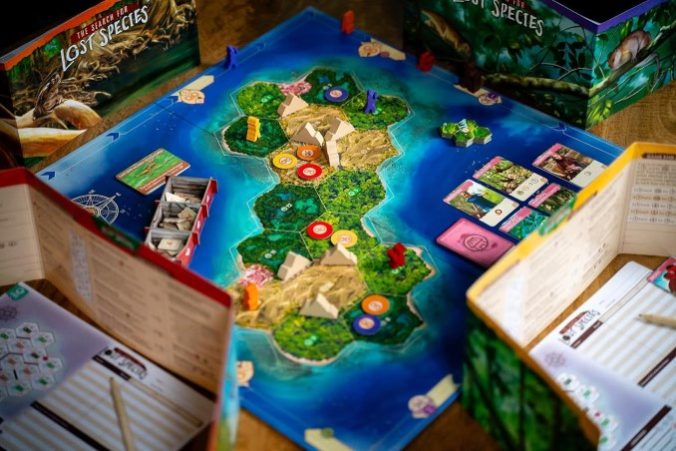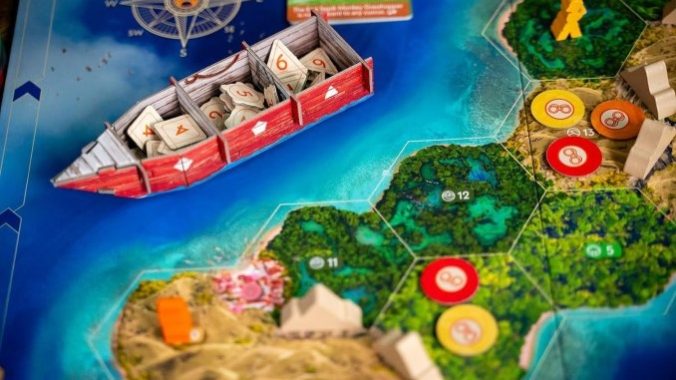The Search for Planet X was my #1 game of 2020, and stands as one of the best deduction games I’ve ever played. Players gather clues to try to find the missing tenth ninth planet, but with points available for finding other objects on the celestial map, so it’s more than just a race to get a single answer. It’s remained a huge hit, both because it’s very well designed (with high replayability) and because that’s a genre without a lot of great games in it.
The sequel, The Search for Lost Species, ups the ante with a harder challenge on an actual map, bonus cards, and some rules tweaks, producing a game that runs longer and at least taxed my brain more than the first one ever did. That could go either way for you, depending on what you want in a game and if you’ve played the original.
The Search for Lost Species is based on some actual science history, as the first game was; in this case, you play as scientists looking for a lost species on an island in one of the archipelagos in southeast Asia where many “lost” species have been found in the last few decades. You search for one specific species, which will be in one hex of the 16 on the island map. Five hexes are empty, while the others each contain one animal type of the other four. You get the most points, by far, for finding the lost species first, but you can also gain points by correctly identifying which species is in any of the other hexes on the board. Every game is different—you use an app that gives you a unique four-character code for that specific setup and solution.
You gather clues by moving through a number of hexes, tapping those hexes within the app, and then selecting one animal type to search for in that region. The app then tells you how many hexes in your chosen set contain that animal, an answer that could be zero, and that doesn’t tell you where the animals are—you need to deduce that from other clues or later searches. You can also move to a town to ask for one of that specific game’s six research clues. You can also use your camera token to get a specific answer to what’s in one hex, although if that hex contains the lost species, the camera won’t show anything (if it was that easy to catch, it wouldn’t be lost). All of the information comes through the game’s very slick, easy to use app, which works best if all players have it on a device but can be used on a device that’s shared among several or all players. You choose your action, enter the required information, and get the clue. The app saves your move history, so you can go back and find information you may have forgotten or double-check something you noted earlier.

One of the best aspects of The Search for Planet X, also appearing here in The Search for Lost Species, is that you can customize the game for each player’s experience. Within the app, each player sets their preferred difficulty level, which then determines how many starting clues they get—as many as 12 for a novice, eight for easy, and so forth. You’re all still playing the same puzzle with the same solution, but this way you can bring younger players or non-gamers into the fold without having to change the game experience for you.
This is a tough teach, as midweight games go, even for players who might understand deduction games or logic puzzles. Both The Search for… games have a similar turn mechanic, where different search actions take different amounts of time, and thus have players moving around the time track at varying speeds, with the player in the rear next to go, meaning some players will end up getting more turns than others because they choose less time-consuming actions. Many clues in this game involve geographical directions, such as “there are fewer than two animals in a direct line northeast of the Lost Species,” which I understand is proper English but which I still found clunky and hard to explain to the other players.
I talk a lot about accessibility in games as a general value, but as I’ve gotten a little older, I’ve found that I need my glasses for more games than I used to, so I’ve become even more sensitive to the issue. Some of the icons in The Search for Lost Species are just too damn small to my half-century-old peepers. The orange cuscus and red lory icons in particular were too similar for me, and in general looking at my personal scoresheet started to strain my eyes after an hour or so. I’m not sure I could tell you a better way to do this other than to just make the scoresheets giant, but I didn’t have the same issue with Planet X (when I was, of course, three years younger, but still, its scoresheet was cleaner and icons easier to read).
I’m also not sold on the addition of the Town cards, which either boost an existing action or award game-end bonus points. You get these by visiting either Town, the cheapest action by time required (1 space), after which you take one face-up town card and take a research action. The cards aren’t that powerful and the points awarded are marginal, while you can only take the research action a maximum of six times in the game. It just didn’t add to the gaming experience for me.
I’ve found The Search for Lost Species to be about 15 minutes longer and more difficult to solve than the first one. That could be a positive or a negative, depending on your perspective. I thought the original was close to perfect, and given the choice, I’d play that one over this newer one… but if I’d never played Planet X, I’d probably think more highly of this game (which, again, is very good on its own merits). I also could understand some experienced players finding the first one a little too streamlined, or just wanting a new challenge, and for them Lost Species will be exactly what they’re looking for.
Keith Law is the author of The Inside Game and Smart Baseball and a senior baseball writer for The Athletic. You can find his personal blog the dish, covering games, literature, and more, at meadowparty.com/blog.

